I'm using AVPlayer for a radio app using HTTP live streaming. Now I want to implement a level meter for that audio stream. The very best would a level meter showing the different frequencies, but a simple left / right solution would be a great starting point.
I found several examples using AVAudioPlayer. But I cannot find a solution for getting the required informations off AVPlayer.
Can someone think of a solution for my problem?
EDIT I want to create something like this (but nicer)

EDIT II
One suggestion was to use MTAudioProcessingTap to get the raw audio data. The examples I could find using the [[[_player currentItem] asset] tracks] array, which is, in my case, an empty array. Another suggestion was to use [[_player currentItem] audioMix] which is null for me.
EDIT III
After years already, there still not seems to be a solution. I did indeed make progress, so I'm sharing it.
During setup, I'm adding a key-value observer to the playerItem:
[[[self player] currentItem] addObserver:self forKeyPath:@"tracks" options:kNilOptions context:NULL];
//////////////////////////////////////////////////////
- (void)observeValueForKeyPath:(NSString *)keyPath ofObject:(id)object change:(NSDictionary *)changecontext:(void *)context
if ([keyPath isEqualToString:@"tracks"] && [[object tracks] count] > 0) {
for (AVPlayerItemTrack *itemTrack in [object tracks]) {
AVAssetTrack *track = [itemTrack assetTrack];
if ([[track mediaType] isEqualToString:AVMediaTypeAudio]) {
[self addAudioProcessingTap:track];
break;
}
}
}
- (void)addAudioProcessingTap:(AVAssetTrack *)track {
MTAudioProcessingTapRef tap;
MTAudioProcessingTapCallbacks callbacks;
callbacks.version = kMTAudioProcessingTapCallbacksVersion_0;
callbacks.clientInfo = (__bridge void *)(self);
callbacks.init = init;
callbacks.prepare = prepare;
callbacks.process = process;
callbacks.unprepare = unprepare;
callbacks.finalize = finalise;
// more tap setup...
AVMutableAudioMix *audioMix = [AVMutableAudioMix audioMix];
AVMutableAudioMixInputParameters *inputParams = [AVMutableAudioMixInputParameters audioMixInputParametersWithTrack:audioTrack];
[inputParams setAudioTapProcessor:tap];
[audioMix setInputParameters:@[inputParams]];
[[[self player] currentItem] setAudioMix:audioMix];
}
So far so good. This all works, I could find the right track and setup the inputParams and audioMix etc. But unfortunately the only callback, that gets called is the init callback. None of the others will fire at any point.
I tried different (kinds of) stream sources, one of them an official Apple HLS stream: http://devimages.apple.com/iphone/samples/bipbop/bipbopall.m3u8